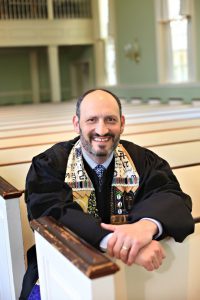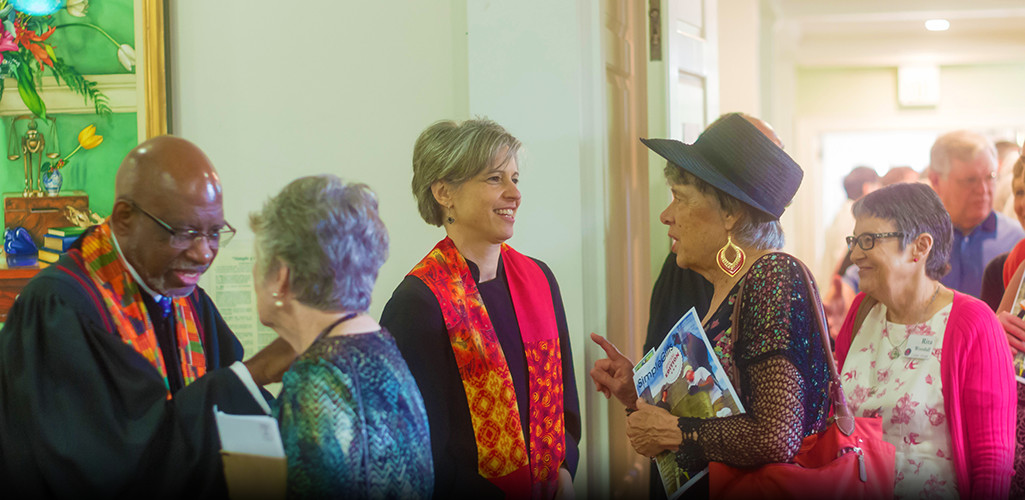
By Eagle Newswire
“Our hope is to open our church downtown in 2021 for All Souls’ 100th birthday, which is also the same years as the 100-year anniversary of the Tulsa Race Riot Massacre. How amazing will it be for us—black, brown, white, and others—to build and dedicate a church together, 100 years after our city and its soul was torn apart? It would be a symbol of hope and a source of healing,” Rev. Dr. Marlin Lavanhar, All Souls Senior Minister, said in his sermon on Sunday, April 9.
In a special Congregational meeting following the service, All Souls members voted by more than 80 percent in favor of launching a capital campaign to build a 21st century church. The vote reaffirmed the 2011 decision to accept a gift of one city block in downtown Tulsa between Frankfort and Kenosha avenues and Sixth and Seventh streets, where the Inner Dispersal Loop exits onto Sixth street.

During Rev. Dr. Marlin Lavanhar’s sermon, he reflected on how this 10-year project began. “As a congregation, we created our Centennial Vision for 2021. We imagined and committed ourselves to becoming a multi-cultural, multi-racial, multi-theological church. What we know now is that it is risky to create a church with such diversity. It’s romantic and uncomfortable. It’s unpredictable and demanding.” He asked the congregation why they want to be a part of a multi-cultural church. Answers ranged from love, to hope, to reflect the world we live in, to “we want our children to trust other people and other cultures,” and landed with, “it makes us whole.”
The location for the new church will put All Souls near the Greenwood Cultural Center and John Hope Franklin Center for Reconciliation (JHF Center), the Mayor’s office, and other organizations the church’s social justice and ministry teams work with in the community. “We are honored to see All Souls continue the work of reconciliation and inclusiveness throughout Tulsa and beyond,” Jean Neal, Development Manager for JHF Center said. “We congratulate them and wish them success on their capital campaign.”
In May, the JHF Center will host its “Reconciliation in America National Symposium” on the 96th anniversary of the Tulsa Race Riot Massacre. The All Souls production of “Soulful Journey” will be featured in the opening ceremonies. “We are a part of the sacred work of repairing the tears in the human family,” Rev. Lavanhar continued in his sermon.
The vote to launch the capital campaign meant different things to different people in the congregation. Yadenee Hailu, All Souls member and student minister, says the vote symbolized an affirmation from the church to continue to work with all people as equals. “All Souls isn’t satisfied to simply welcome all people; it wants to be of all people. I think this is a revolutionary, healing, beautiful, and exciting thing.”
“This move allows us to be effective in our intercultural work across lines of race, class, sexuality, and ability. Downtown is an intersectional neighborhood with greater accessibility,” Steven L. Williams, LGTBQ advocate and student minister said.
The official capital campaign launch will happen later this year, but All Souls members and friends are already making their contributions and pledges. “We are already seeing the support we have from our community to make our vision a reality,” Alison Olig, Executive Director of Stewardship said. To support All Souls’ capital campaign, contact the church office at 918-743-2363 or email gifts@allsoulschurch.org.
About All Souls
All Souls Unitarian Church was established in 1921 in Tulsa, Oklahoma and offers three distinct services each Sunday – Traditional service at 10:00 a.m., the Contemporary service at 11:30 a.m., and the Humanist Hour at 11:30 a.m. The 2000+ member congregation adopted a vision for the All Souls’ centennial in 2021. “Our church is an embodiment and celebration of the world as we hope it will one day become. A climate of profound hospitality, love, and acceptance radiates from our campus and our members. Our sanctuary is bursting with people from a diversity of theologies, philosophies, ethnicities, cultures, colors, classes, abilities, generations, sexual orientations, gender identities and gender expressions and political persuasions—all dwelling together in peace, seeking the truth in love and helping one another. Our compassion is reflected in our actions to care for one another, our neighbors and the environment. Our religious education involves all ages and aims at connecting heads, hearts, and hands.”









